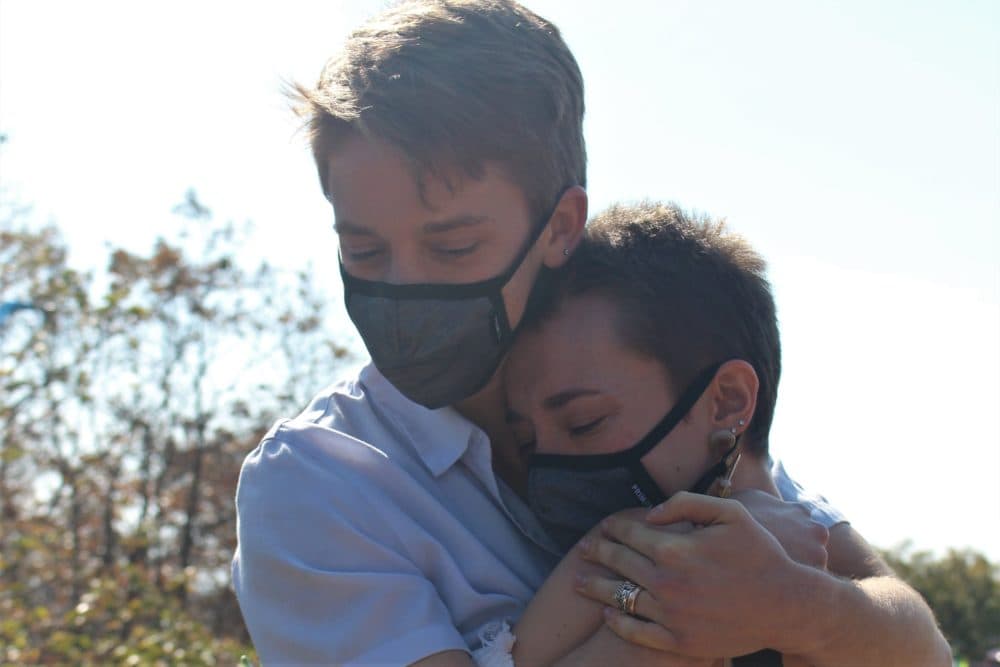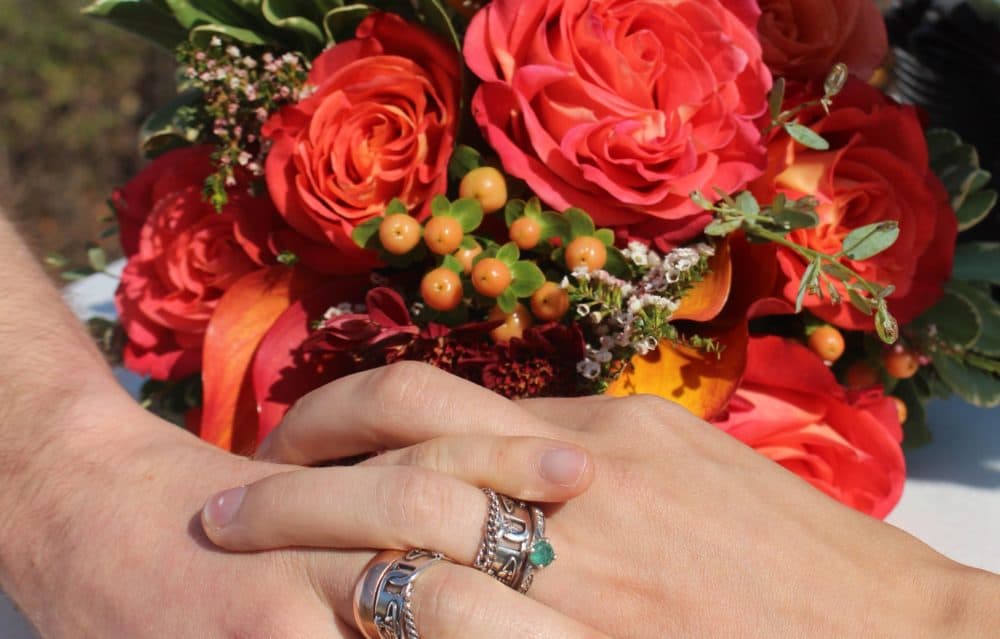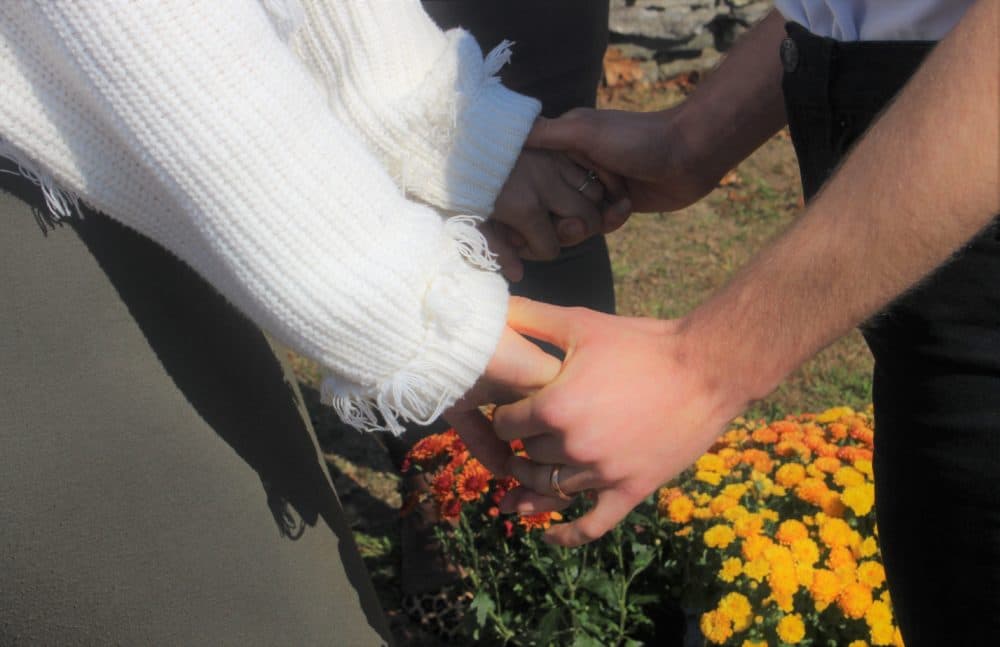Advertisement
Commentary
Amy Coney Barrett’s Confirmation Brings An Uninvited Guest To My New Marriage: Fear

“Should my girlfriend and I get married before Amy Coney Barrett is confirmed?” a friend texted my then-fiancée late one night. Like us, her friend is queer. Ruth Bader Ginsburg's death and the subsequent confirmation of Amy Coney Barrett has left a pit in the collective gut of the LGBTQ community. With headlines like “Supreme Court justices set stage to end marriage equality,” how could it not? In truth, I had been wondering the same thing.
Like many other couples this year, we postponed our big wedding due to COVID-19. But we still wanted to get married. We'd started the process of filing for a marriage license but had not planned the ceremony details or date together. Unknown to my fiancée, I had already begun frantically planning a surprise wedding ceremony. I spoke with an organizer weekly to discuss and plan the details of cake flavors and flower arrangements. The changing legal landscape had not played into this decision, but it certainly made us feel less secure.

While listening to the radio on my drive to work, I heard the newly-delivered statement by Justice Clarence Thomas, joined by Justice Samuel Alito, in a case involving Kim Davis. Davis is a Kentucky county clerk who was sued for refusing to issue a marriage license to a gay couple. The court rejected her appeal, but the two justices took the opportunity to reiterate their criticism of Obergefell v. Hodges (the Supreme Court decision that made same-sex marriage legal nationwide), saying it limited religious freedom and allowed courts to label those “who believe marriage is between one man and one woman as bigots.” They added that since the Obergefell decision, those “with sincerely held religious beliefs concerning marriage will find it increasingly difficult to participate in society.”
I swallowed hard. Two weeks earlier, my fiancée and I had gone to a county clerk to acquire a marriage license. I imagined what it would have been like if that employee had withheld this necessary document. How angry, powerless and devastating I would have felt. In many states, this was the reality for gay and lesbian couples only five short years ago. The Obergefell case gave us an unprecedented amount of protection from this discrimination. Critics of Thomas’s statement remind us that government employees cannot discriminate against others based on their religious beliefs. They also point out that Thomas's statement implies that religious freedom is more important than other rights. My rights.
We never planned our wedding as a protest. But in the face of continued threats to our rights, it felt oppositional, even defiant.
It was an immensely uncomfortable feeling to hear others debate, again, the legitimacy and extent of my rights. It is painful and unsettling to hear the country's most prominent members of the judiciary support those who would choose to deny us the ability to marry. These conversations continued as I marched forward with wedding planning. The cake would be chocolate raspberry because the combination seemed romantic to me. Her bouquet would be orange roses because we decided that orange was our color a month into dating.
On Oct. 10, we headed to a campsite in rural Massachusetts. I told her there was a mountaintop on the way that would be perfect for a fall photoshoot, so she should wear something nice. Holding hands, I led her to where my planner had arranged the ceremony — complete with an altar and aisle. My fiancée was surprised and touched. The ceremony was short: 12 minutes. But those 12 minutes were filled with tears, smiles, promises and (most importantly) love.
We never planned our wedding as a protest. But in the face of continued threats to our rights, it felt oppositional, even defiant. Disconnected, heterosexual lawmakers continue to shroud the debate about gay marriage in theoretical terms. But for us and other queer couples, marriage does not exist in text or theory. It is personal. A lived experience. Our marriage ceremony was a breathtaking moment filled with joy and devotion. Arguments that support someone’s ability to prevent these moments, no matter the legal or religious justification, are simply cruel.
Advertisement

As the hearings for Amy Coney Barrett continued, more evidence surfaced indicating that the growing conservative majority on the court will seek to undermine LGBTQ rights. Barrett recently referred to sexuality as a “sexual preference,” an outdated and offensive term that wrongly implies sexuality is a choice. With these continued threats and invalidation, it is easy to feel worn down.
Recently, fear of what the future holds is often an uninvited guest in our relationship. But from our wedding, I took away a valuable lesson. Moments of joy can also be acts of resistance. Driving home we reminisced, laughing about how windy it was and about how the cake was absurdly large for only two people. At least for now, the fear and voices of unwanted opinions faded behind our well-deserved happiness.
